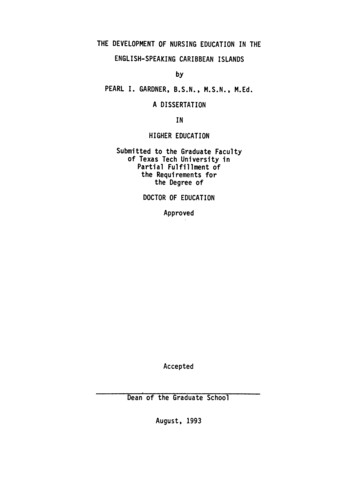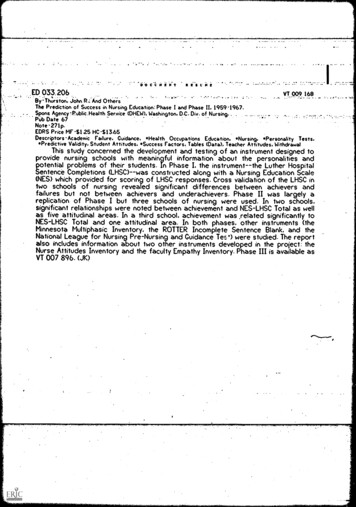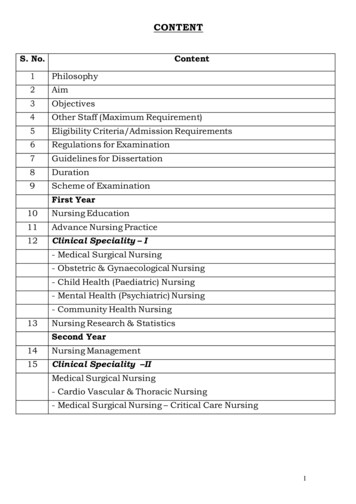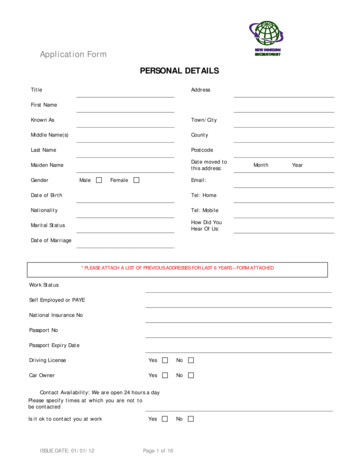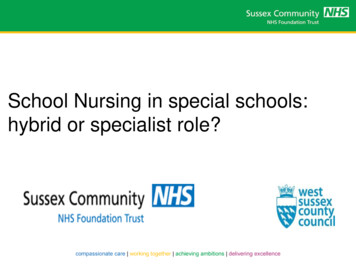
Transcription
School Nursing in special schools:hybrid or specialist role?
National drivers- England The SEN and disability reforms within the Children and Families Act 2014– A “local offer” of services across education, health & social care with children& parents involved in preparing and reviewing it– Services across education, health and care to be jointly commissioned– New Education, Health & Care plans, with the option of a Personal Budgetfor families and young people who want one– New statutory rights for young people in further education– A stronger focus on preparing for adulthood 0-25 SEND Code of Practice - DoH & DfE January 2015– Statutory duty on maintained schools and academies to make arrangementsto support pupils with medical conditions. Individual healthcare plans willnormally specify the type and level of support required to meet the medicalneeds of such pupils– Where children and young people also have SEN, their provision should beplanned and delivered in a co-ordinated way with the healthcare plan. Schoolsare required to have regard to statutory guidance ‘Supporting pupils atschool with medical conditions’ DfE 2014Ofsted/CQC local area inspections
DfE 2014 Supporting pupils at school with medical conditions– The governing body must ensure that arrangements are in place to supportpupils with medical needs– They should ensure that such children can access and enjoy the sameopportunities as any other child– Take into account that many of the medical conditions that require support inschool will effect quality of life and may be life threatening. They shouldensure that the focus is on the needs of each individual child and how theirmedical condition impacts on their school life.– Arrangements should give parents and pupils confidence in the schoolsability to provide effective support; how the medical condition impacts on achild’s ability to learn, as well as increase their confidence and promote selfcare.– They should ensure that the staff are properly trained to provide the supportpupils need.– They should ensure that all schools develop a policy for supporting pupilswith medical conditions that is reviewed regularly and is readily accessible toparents and school staff
West Sussex Special school nursing Child population 0-19yrs: 186,335 (2014)1570 students across 12 special schoolsProvision before the review– 1 school CCN (CCG); 1 school employed by school (LA); 2 schools SLA withhealth provider (LA); Remaining schools PHScN- no clinical nursing– Public health school nursing service specification 2014 – clinical nursing inspecial schools not in scope– Children’s Community nursing access to all special schools – visits– Inequitable & unsustainable provision– Increasing complexity; fluctuating health & everyday needs in schools2015 Task & finish group– Special school Head Teachers survey– Parent/Carers survey- WS Parent/Carer Forum– Health needs assessment of students in special schools– Skill mix review
Complex and fluctuating health needs likelyduring the school dayA high degree of health complexity and fluctuating health requiring regular nursing support isindicated by: Pupils who fulfil CYP continuing care criteria Pupils identified as having a life limiting/life threatening condition (Together for ShortLives) Pupils who have frequent and/or intensive periods of unpredictable or unstable healthNo. of pupils per school with indicators of complex and fluctuating healthComplex &fluctuatinghealthMGPPWMS3433 77HDQEIIFWMGC30 39 51 39OakWMC35 24ALGCF9 1 0
Complex long-term health conditions CYP within a school with complex health needs require a registered children’snurse to provide nursing advice, professional liaison, assessment, care planning,healthcare training for school staff and healthcare evaluation:egs– complex neuro-disability: autonomic storming; dystonia; severe spasms– tailored pain profile protocol in school– post- operative needs following complex surgery e.g. spinal surgery, hip surgery, bilateraltendon release– tissue viability needs e.g. wound dressings/regular risk assessmentNo. of pupils per school with indicators of complex long-term conditionsMGPComplex LTCassociatedhealth needsPWMSHDQEIIFWMGCOakWMCAntLGCF104 63 114 20 104 103 102 65 62 3* 00
Everyday complex healthcare needs Some CYP need support with their complex health needs every day.Support ranges from trained adults carrying out clinical health procedures throughto adults supporting the young person to carry out the procedure themselves.Includes: pupils who fulfil CYP continuing care criteria (DH England) pupils who are fed enterally everyday- gastrostomy, nasogastric, jejunostomy or TPN pupils who have complex respiratory everyday needs e.g. tracheostomy; ventilation,nasopharyngeal airway; deep suctioning; oxygen therapy; nebulizers pupils who have complex epilepsy – seizure profile /plans development/ketogenicdiet/rescue medicine protocol eg buccal midazolam pupils requiring blood glucose monitoringContinuing careEverydayClinical/healthproceduresMGPPWMS2193 1531 51HDQEIIFWMGC4 5 13 120 26 34 39OakWMC9 235 24AntLGCF260 00 0
9 of the 12 schools have a combination of all three complex health needs factors: Complex and fluctuating health Complex long term health conditions Everyday complex healthcare needs Mental health needsMGPPWMSHQEIIFMGCOWMC45259931215 10ALGCFMentalhealth13 63 53
Nursing roles, establishment & skill mix There are a number of nursing roles providing a nursing service to children and youngpeople in the special schoolsSchool Nursing MGPWMSPHFQEIIWMCMGCOakACLGPHSc Nx x ( ) x x xx x xx ( ) x ( )x ( )x ( )x ( )xLAC NCoNSCCNSSN KeyPHSc N: Public Health school nurse; LAC N: Looked After Children nurse; CoNS: ContinenceNurse Specialist; CCN: Children’s Community Nurse; SSN Special School Nurse the nurse regularly accesses the school providing a service( ) the nurse accesses the school if priority nursing indicates but rare or nurse not funded.X the nurse does not provide a service for this school, no nurse funded or on long termleave.
West Sussex Special school nursingReview Recommendations That 9 schools require a clinically trained nurse. The RCN recommend this be aRN Children registration because of the delegated duties. That there should be 4 posts across the county that are all year round to provideeffective safeguarding, transition and EHCP cover during holidays All special schools require public health school nursing: 3 schools through thePHScN service and 9 integrated public health/clinical That all special schools have access to specialist school nursing service fundedjointly between health and education with the nursing skill mix aligned to pupilneeds within schools That health & school commissioners develop a service specification That additional information gathered such as everyday healthcare needs andmedicines is used within the Local Authority special school funding review toinform the teaching support staff establishment and skill mix That mental health needs further refined through the mental health project
Nursing need- from the review ActivityHealth needs identified as complex, fluctuating and everyday for many of the CYPIdentified physical and mental health needsWe know the likely core nursing activity and fluctuating activity across the yearHighlighted significant school staff training, competency & ongoing support roleBaseNurse needs to be aligned to a school but part of a comprehensive community nursingservice- governance & business continuitySchool & locality; empowering school staff to be able to care for the CYP themselvesknowing that they have regular & timely access to a clinical school nurseChildren who need a nurse to be on site- covered within their EHCP/CHC packageSkill setNursing is likely to be required from a range of clinical nursing roles- All clinical nursesworking with children and young people should hold a registered nurse childrenqualification (RCN 2011).The nature of the work for the nurse in special schools combines both public health &clinical nursing, i.e. a specialist hybrid role.B6 PHScN/PHCCN/Nurse Practitioner- children
What is the core offer for special school nursing within the NHS?– For all disabled children in all maintained special schools The public health offer– The healthy child programmeThe complex needs offer– Episodic management of complex, fluctuating health;– Ongoing management of their long term health condition and– Supporting others with meeting their everyday healthcare needs
Specialist provision of school nursing in special schools- complexhealth needs & SEND Public health for all CYP in special schools health questionnaire for general health assessmentscreening tests (hearing, sight, weight, GP, consent, dentist, immunisations)Drop in services and/or themed sessions aligned to the school health improvementplanPublic health- healthy weight and smoking adviceHealth education programme – appropriate to the health needs of the childrenwithin the school eg epilepsy awareness Do all children in special schools in your locality have access to this provision?
Specialist provision of school nursing in special schools- complex healthneeds & SEND Specialist public health and complex health needs & disability, health andwellbeing:Annual health review and care planningAdvice on emergency/rescue medication to manage epilepsyBespoke sexual health advice and PSHE tailored advice/input;Emotional/ mental health assessment, support and referral;Weight management- specialist to disability/complex health;Promoting continence (level 1);Identify alcohol/drug issues and refer/signpost as appropriate;Contributing to LAC health reviews with LAC nurse teamWorking with other disciplines to deliver behavioural management programmesAdvise on school management of medications in schoolAdvise on infection prevention and control in the school settingAdvise on safe feeding practices, including enteral feedingIdentify health issues and contribute to management of transition to adult services
Specialist provision of school nursing in special schools- complex healthneeds & SEND Specialist partnership plus- complex health needs & disability health andwellbeing: Children in Need / Child protection – statutory health professional dutiesComplex health management and clinical nursing assessment for children withcomplex health needs, including children with Life Threatened/ Limiting conditionsHealthcare training and competency programme developed in partnership withschools. Includes competency healthcare training of delegated duties on a namedchild basisEHCP- nursing input
A schools policy for supporting pupils with medical needs– All relevant staff are made aware of child’s condition– Who is responsible for ensuring sufficient staff trained– Cover arrangements & briefing for supply teachers– Risks assessments for school visits and other school activities outside normaltimetable– Role of healthcare plans; who is responsible for their development and themonitoring of them– Procedures when school notified that a pupil has a medical condition– Clearly identifies the roles & responsibilities of all those involved in thearrangements– What should happen in an emergency situation– Supporting pupils to participate in school trips, visits, sporting activities etcStaff training & support– Policy needs to set out how staff will be supported in carrying out their role tosupport pupils with medical conditions & how this will be reviewed.– How training needs are assessed, & how & by whom training will be commissioned& provided– Staff must not give prescription medicines or undertake health care procedureswithout appropriate training sufficient to ensure staff are competent & confident
The role of the school nurse– Notifying the school where a pupil has a medical condition– Involvement in the individual healthcare plan & emergency plan Support, advise and liaise– Advise on who should lead on training staff Could be school nurse; children’s community nurse or clinical nursespecialist Who is responsible in your locality? Delegated duties framework Does your organisation have a delegation policy that includesdelegating outside of your organisation? Healthcare/clinical procedure training and competency assessment Are you clear about your own governance when you train others? Does your Trust have a Standard operating procedure for delegationthrough formal partnership arrangements?
Delegated Duties within FormalPartnerships Delegated Duties Assessment–––––––– The Learning Model––––– Is there a contract to provide delegated duties in place?Is the task on the RCN approved list?Is the task specified within the support workers role and Job Description?Does the employer have appropriate policies, procedures in place to supportdelegation?Has appropriate consent been gained?Is the delegation on a named child/young person basis?Is the delegation specified within the child/young person’s care plan/EducationHealth Care Plan (EHCP)/school healthcare plan?Is the environment appropriate for the task to be carried out?Underpinning KnowledgePractice TrainingCompetency AssessmentOngoing support and supervisionDocumentation check and final sign offAudit
Trudy Ward MSc; RNC; RNA; RNE; Queen’s Nurse Head of Children & Young People’s Community Nursing Services Trudy.ward@nhs.net07990551777
West Sussex Special school nursing Child population 0-19yrs: 186,335 (2014) 1570 students across 12 special schools Provision before the review - 1 school CCN (CCG); 1 school employed by school (LA); 2 schools SLA with health provider (LA); Remaining schools PHScN- no clinical nursing
